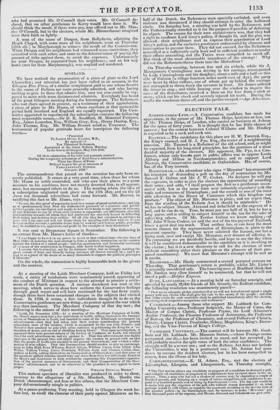SCOTLAND.
We have noticed the presentation of a piece of plate to the Lord Chancellor; our attention has just been called to an account, in the Glasgow Free Press, of a similar compliment paid to one whose deserts in the cause of Reform are more generally admitted, and who having nothing to give to those that admire him, may not unnaturally be supposed to meet with more disinterested admirers. Everybody has heard of the great Glasgow meeting during the Interregnum, The Reformers who met there agreed to present, as a testimony of their approbation, a piece of plate to Mr. Hume, of whose exertions at that memorable period both Scotland and England are equally cognizant. The Committee appointed to superintend the subscription contains the following most respectable names,—Sir D. K. Sandford, M. Moncrief Paulson, Esq., James Lumsden, Esq., William Gray, Esq. Henry Dunlop, Esq., John Thomas, Esq. Mr. William Bennet acted as Treasurer. The testimonial of popular gratitude bears for inscription the following words- "Presented To JOSEPH Home. Esquire. M.P., BY upwards of Ten Thousand Reformers, Assembled at the Great Reform Meeting, In the Green of Glasgow, May 17th 1832, In testimony Of their admiration of his bold and patriotic conduct During the temporary retirement of Earl Grey's Administration, When the House of Peers Refused to pass the great measure of
PARLIAMENTARY REFORM,
Glasgow, 1832."
The correspondence that passed on the occasion has only been recently published. It comes at a very good time, when those for whom Mr. ...Hume so nobly contended, and who owe their places in a great measure to his exertions, have not merely deserted him, to all appearance, but encouraged others to do so. The meeting where the idea of a subscription originated took place on the 17th May, and on the 2d June ten thousand subscribers had come forward. 111r. Bennet, in notifying this fact to Mr. Hume, says— "To you, Sir, this proof of popularity must be a source of proud satisfaction,—arising. as it spontaneously does, from the enthusiastic ..eratitude of a generous and publicspirited people, too intelligent and manly to bow their heads to any species of tyranny, or pay deference to any by whom such tyranny is supported; yet affectionate, grateful, and confiding towards all whom they feel convinced are sincerely honest in defeteling their rights, and desiring their welfare. Of all this they feel convinced in reference to you.; anti lain sure you will not blame them for mingling with their wish to de honour on that account, a patriotic desire that, by making such honour public, posterity may be enabled to see, appreciate, and profit by the example of their forefathers" It was sent to Bryanstone Square in September. The following is an extract from Mr. Hume's letter of thanks—
"1 was happy to have it in my power to assist at that critical time—the ten days of May 1532—in resisting the mad attempt to force a military domination on the country against the wishes of a united people : and this spontaneous and favourable testimony of so many of my countrymen in Glasgow, adds much to that happiness. " I esteem this testimonial, not for its intrinsic value, but as strongly marking the great extent of kind and friendly feeling amongst all classes towards me ; and I accept it as a proof of the desire of so many thousands to support the political principles I advocate."
On the whole, the transaction is highly honourable both to the givers and the receiver.


























 Previous page
Previous page